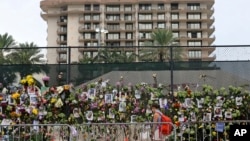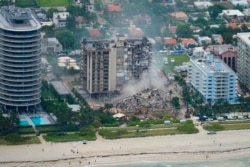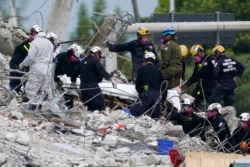The search continues for victims of the collapsed Champlain Towers South condominium building in Surfside, Florida. And the process of seeking answers about why it fell and who is to blame has already started in the state legal system.
Officials have opened criminal and civil investigations into the collapse of the building. Late Wednesday, rescue workers ended their two-week search for survivors, and are now just looking for the dead. Officials said there was “no chance of life” under the destroyed building.
The Associated Press reports that at least 54 bodies have been found and 86 people are missing. Miami-Dade State Attorney Katherine Fernandez Rundle said she would bring the issue to a grand jury. A grand jury gathers evidence and could recommend criminal charges or rule changes.
Additionally, residents of the building have brought at least six legal cases. Jeffrey Goodman is a lawyer representing the children of missing resident Harold Rosenberg.
“We deserve to be able to walk into buildings without worrying that they’re going to come crumbling around us,” he said.
The legal cases accuse the Champlain Towers South Condominium Association of failing to deal with serious problems. Structural problems were first seen in 2018.
Some of the cases also name a local architect and engineer. Goodman’s legal group said the town of Surfside will also face legal action. The town’s building inspector had been involved in the discussions about the structural problems.
“The role of building owners and architects and engineers and inspectors and safety professionals is to make sure that buildings are safe,” Goodman said.
At a hearing Friday, a judge appointed a lawyer to represent the condominium association. The board has about $48 million in insurance coverage. The land is worth $30 to $50 million, the judge was told.
The judge said he hoped the lawsuits would end quickly. Until then, he permitted the association’s lawyer to provide $10,000 each to residents for temporary housing and $2,000 to cover funeral costs.
A similar case took place in 2013. The wall of a building in Philadelphia was being demolished and collapsed. The wall fell onto a store next to it, killing six people and injuring 13.
In the trials that followed, a civil jury found the building’s owner and his architect responsible. They paid $227 million in damages.
Criminal charges also were brought. A contractor was found found not guilty of third-degree murder, but received a sentence of 15 to 30 years for involuntary manslaughter.
The collapse also led the city of Philadelphia to pass stronger rules for demolitions.
And in Florida, a grand jury is still investigating the 2018 collapse of a walking bridge at Florida International University that killed six people.
Denis Binder is a law professor at Chapman University in California. He is an expert in disaster cases. He said more victims are seeking criminal charges, in addition to financial damages.
“I think it’s increasing because of the media and social media,” as “everybody’s horrified by what they can see. And there’s this cry for justice,” Binder said.
He added that there is “evidence already [in Surfside] that people have made bad decisions.”
Officials said they would continue the search efforts until they find the remains of every one of the missing.
I’m Dan Novak.
Dan Novak adapted this story for VOA Learning English based on reporting from The Associated Press. Mario Ritter, Jr. was the editor.
________________________________________________
Words in This Story
condominium— n. a room or set of rooms that is owned by the people who live there and that is part of a larger building containing other similar sets of rooms
resident — n. someone who lives in a particular place
deserve –v. used to say that someone should or should not have or be given something
crumble — v. to break (something) into small pieces
architect — n. a person who designs buildings
role –n. the part someone plays in an activity or situation
demolish — v. to destroy (a building, bridge, etc.) : to forcefully tear down or take apart (a structure)
involuntary — n. not done by choice
manslaughter — n. the crime of killing a person without intending to do so







